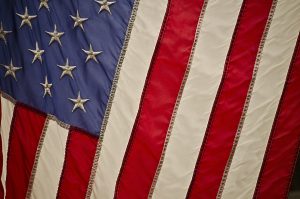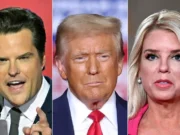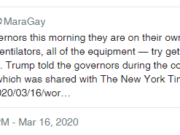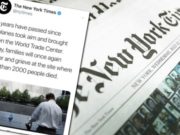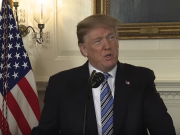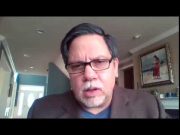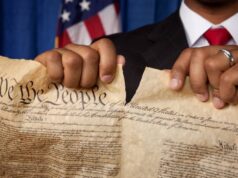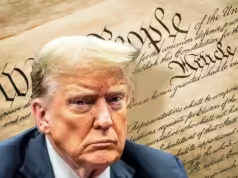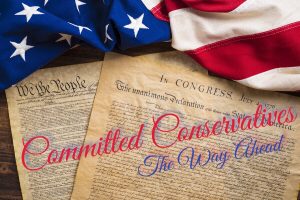Can’t a fellow just go out on a 20-degree night and “enjoy” his daughter’s soccer game without two branches of the government losing their minds? Nothing is more brutal than the collision of judicial tyranny and an imperial Presidency.
At Committed Conservative, we are neither cheerleaders for, nor knee-jerk opponents of, the President. We are conservatives. Likewise, we take remarkably seriously the rulings of our federal judiciary. As a lawyer, former law professor, and a former assistant law school dean, I am compelled to do so.
When I appear in media, it is often as an expert associated with legal issues. To be sure, I don’t hold myself out as the leading guru on federal jurisdiction. I do, however, fully understand that area of law, having learned it, practiced it, taught it, and indeed commented on it. I also know what judicial tyranny looks like.
Imagine my surprise when I heard that a senior status, Federal Judge in Seattle Washington, granted a national injunction against the President’s Executive Order on immigration that pauses travel from seven countries previously identified as terror-sponsoring or terror-threat countries. When I write previously identified, I mean the Obama Administration, with our national intelligence network, made these determinations.
Mr. Trump’s Executive Order set out to stop travel from those countries by non-citizens.
For sure, I have written here, Mr. Trump’s Executive Order is fraught with real constitutional issues, and was rolled out with all the expertise of a kindergarten painting class. I’ll address the President’s issues more fully below.
First, however, the lawyer in me could not wait to read the legal basis of the Judge’s Order. I was dying to see just how he had jurisdiction over the entire country. I don’t know much about the Federal District Court of Washington State, but I was fairly sure the powers of that district were confined to that district, absent a host of facts not here present.
This morning, I set out to find a story about the ruling, and then like a good lawyer I looked for the actual ruling. Court’s speak through their order and opinions. When someone tells me a Judge finds something unconstitutional, I look to see the legal basis for that finding. I’m wacky that way. Lots of people claim issues to be Constitutional or not, but it is the analysis and correctness of that analysis that determines the validity of an opinion.
The first story I found about the Injunction order identified the Judge and his interesting and colorful background. He’s a Black Lives Matter fan. As always, newspapers also look to see by whom a judge is appointed. In this case, he is a “Bush appointee,” which in the minds of some means that his ruling has more merit because a Republican federal judge struck down a Republican presidential executive order. Being right or wrong in the legal analysis has little to do with the President who appoints a judge.
It is true, sadly, that we can more often predict an “outcome” based on who appointed whom and the given issue. However, the analysis of a legal issue stands and falls on its own. I opened the “opinion,” and what to my wondering legal mind do I find … nothing!
The Judge made a ruling that the Executive Order of the President is likely to be found Unconstitutional, and thus he granted the extraordinary relief of an injunction, nationwide. He does not state the basis for the unconstitutionality of the President’s action, nor does he state the basis of his power to grant an injunction across the country.
Not everyone who reads this piece is a lawyer. However, if you are at this site and still reading to this point, you have, at minimum, common sense and intellectual curiosity. Ponder this? How is it that a President, any President, who has under Federal law nearly plenary or absolute power over immigration with respect to granting entrance to non-citizens of the country, particularly with respect to national security matters, can be over-ruled by a Federal Judge, who by definition over-sees Federal issues arising solely in his or her own, small, Federal District?
In the common sense approach to all this, who is it that has more likely over-stepped his delegated and enumerated powers? More plainly, is it logical that a Federal District Court Judge from the District of Washington can solely determine what immigrants can enter the US and the President cannot? That’s curious all by itself.
Certainly, in rare circumstances, a Federal Judge of this type might make a ruling that properly impacts more states than his or her own district. The facts and the law at issue, as well as the Plaintiffs before the court determine if that ruling has a greater scope. This Judge has no legal basis for the national scope of his order … and I mean … none. Likewise, he doesn’t even try to give the legal basis, other than his dicta that immigration law must be uniform, and so he therefore grants himself plenary power.
The opinion doesn’t even adequately set out a rationale giving the Plaintiffs, the States of Washington and Minnesota, standing to bring the action. There, the Court refers to another case, ironically, in which the law and facts were different, and in which the state of Washington argued the exact opposite, saying states could have no such standing. In most competent courts, they frown upon litigants who approbate and reprobate, though admittedly that rule is constrained to the same case.
Still, taking completely different legal positions on the same issue undermines one’s credibility. The Court did no legal analysis in its opinion. It neither applied the law to the facts nor did it attempt to explain how the law or the facts affected each other and demanded the result reached by the Court. The opinion is as thin as gruel, and the analysis would warrant a D in first-year legal research, writing, and analysis. I know, I have taught the subject.
The opinion and order of the Court is judicial tyranny and overreach. What’s worse is that one man in a robe, elected by no one, sitting in one tiny district court, issued an edict, the basis of which is unknown. This action over-ruled a President who the people just elected, and whose powers with respect to protecting the country and issuing entry to non-citizens are remarkably broad. The Constitution and the legislature define a President’s power in these matters. Accordingly, this ruling is shocking.
Alas, this does not mean that Mr. Trump is off the hook for his role in this mostly manufactured political crisis. The Executive Order of the President sought to ban green-card holders and other lawful visa holders from entering the country. That was a legal bridge too far, and a political misstep that opened this President to the lie and canard that this is a “Muslim Ban.”
Let’s me make your life easier. If someone tells you that the President signed an executive order that was a Muslim Ban, you know you are dealing with an idiot, bigot, or partisan, or some combination or derivation thereof. Still, valid US visa holders have rights. We granted them those rights. They are subject to the jurisdiction of the United States under the Constitution by virtue of a status we granted them through our laws. As such, they are entitled to due process.
No President may simply suspend the rights of green-card holders without due process, or without doing it through a process set out in our own laws. It is without question that a travel ban, temporary or not, that purports to stop lawful visa holders from entering the US without suspicion of criminality is, on its face, unconstitutional. To the extent such proper visa holders are out there still being denied entry to the US based on this order, they do have due process rights.
The Presidency is not an imperial position.
A President’s power has limits, and for committed conservatives, we understand that limits on those powers are historical, constitutional, and essential. Likewise, we understand that for nearly eight decades, under some guise or another, Presidents of both parties have been consolidating power under the office of the Executive either directly or through the administrative state.
Mr. Trump’s inexperience in government may be endearing and attractive to those who find our government corrupt and self-serving. I get that. However, his instincts to act with impunity and to demand results based on his views and directives might be great as a CEO … powers I too have wielded … but those instincts are at odds with the limits of his Constitutional authority and our collective separation of powers in what was once a working Republic.
The Executive Order ought to be re-issued to address those matters impacting lawful visa holders. In every other respect, the President is within his authority as set out by our Constitution and our immigration laws.
The Judge in Washington State should retire. The pay is the same, and he can do no more damage to federal law, or the reputation of our judiciary, which is otherwise still the envy of the world.
If you missed it … here is some instant legal analysis from Professor Josh Blackman on these issues.
Author: Richard Kelsey
Richard Kelsey is the Editor-in-Chief of Committed Conservative.
He is a trial Attorney and author of a #11 best-selling book on Amazon written on higher education, “Of Serfs and Lords: Why College Tuition is Creating a Debtor Class”
Rich is also the author of the new Murder-Mystery series, “The ABC’s of Murder,” book one is titled, “Adultery.”
Rich is a former Assistant Law School Dean and Law Professor. At Mason Law Kelsey conceived of, planned, and brought to fruition Mason’s Center for the Protection of Intellectual Property, known as CPIP, drawing on his expertise as a former CEO of a technology company specializing in combating cyber-fraud.
In 2014 he was elected by the graduating class as the faculty speaker at their graduation.
He is a regular commentator on legal and political issues in print, radio and on TV. Rich has appeared on hundreds of stations as a legal expert or political commentator. He provided the legal analysis for all stages of the Bob McDonnell trial and appeal for numerous outlets including NPR and WMAL.
Rich also writes on occasion for the American Spectator and CNSNews.com.
In his free time, Rich is part of the baseball mafia of Northern Virginia, serving on numerous boards and as a little league and travel baseball coach.
His Twitter handle is @richkelsey.

